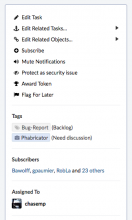iOS would like a tag with which they can identify research spikes. They define research spikes as a story or task aimed at answering a question or gathering information, rather than at producing shippable product. This tag could be structurally similar to Documentation or Epic .
While iOS made the request, I can conceive that this tag would be usable by all teams. I don't know if there would be value in aggregating all of those tasks in one place, but the teams would gain value by being able to filter their own boards.
Proposed description:
"In Agile software development, a "spike" is a research activity aimed at answering a question or gathering information, rather than at producing shippable product, in order to explore potential solutions for a task or set of tasks that do aim at producing shippable product. It is typically time-boxed. See https://en.wikipedia.org/wiki/Spike_(software_development)"

